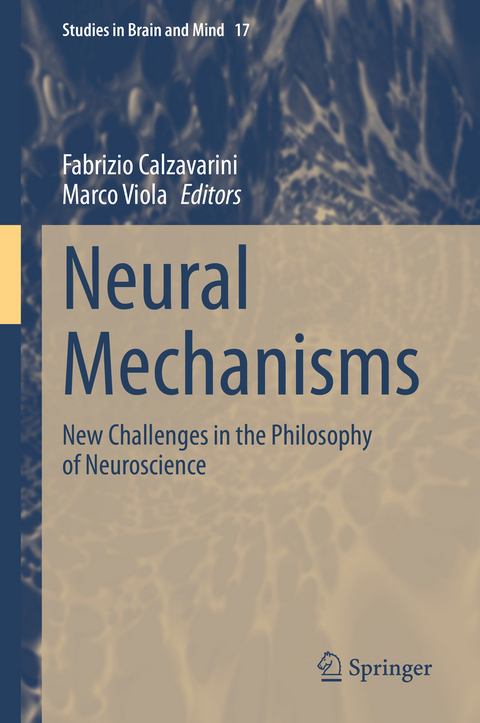
Neural Mechanisms
Springer International Publishing (Verlag)
978-3-030-54091-3 (ISBN)
This volume brings together new papers advancing contemporary debates in foundational, conceptual, and methodological issues in cognitive neuroscience. The different perspectives presented in each chapter have previously been discussed between the authors, as the volume builds on the experience of Neural Mechanisms (NM) Online - webinar series on the philosophy of neuroscience organized by the editors of this volume.
The contributed chapters pertain to five core areas in current philosophy of neuroscience. It surveys the novel forms of explanation (and prediction) developed in cognitive neuroscience, and looks at new concepts, methods and techniques used in the field. The book also highlights the metaphysical challenges raised by recent neuroscience and demonstrates the relation between neuroscience and mechanistic philosophy. Finally, the book dives into the issue of neural computations and representations. Assembling contributions from leading philosophers ofneuroscience, this work draws upon the expertise of both established scholars and promising early career researchers.
Fabrizio Calzavarini is a Post doc Researcher at the University of Bergamo, Italy, and is affiliated with the Center for Logic, Language, and Cognition, Turin, Italy. His research is organized into two interrelated streams. One stream falls at the intersection between the philosophy and neuroscience of semantics, focusing on the neural substrates of lexical competence. The other stream addresses philosophical issues in neuroscience more generally. He is the author of Brain and the Lexicon (Springer, 2020) and the co-organizer of Neural Mechanisms Online, a series of webinars and web-conferences in the philosophy of neuroscience. Marco Viola is a Postdoctoral Researcher at the University of Turin, Italy. His core interest is the philosophy of neuroscience, especially cognitive ontology and the neuroscience of emotion. Other interests include face perception, philosophy of mind and the social epistemology of science. He is the co-organizer of Neural Mechanisms Online, a series of webinars and web-conferences in the philosophy of neuroscience
Part 1: Explanation and prediction.- Chapter 2. Bayesian Explanation in Neuroscience (David Kaplan, Chris Hewitson).- Chapter 3. Your Brain is Like a Computer: Function, Analogy, Simplification (Mazviita Chirimuuta).- Chapter 4. Circuital and developmental explanations for the cortex (Alessio Plebe).- Chapter 5. Prediction and Topological Models in Cognitive Neuroscience (Stanely Gessell, De Brigard Geib).- Chapter 6. Miscomputation in Computational Psychiatry (Matteo Colombo).- Part 2: New concepts and techniques.- Chapter 8. Evolving Concepts of "Hierarchy" in Systems Neuroscience (Daniel Burnston and Philipp Haueis).- Chapter 9. Neural reuse is a general mechanism, but Neural Darwinism is a fundamental theory (Luis Favela).- Chapter 10. Evaluating the Revolutionary Status of Innovations in Network Analysis: Conceptual Ambiguity and Instability as Signs of Progress in Cognitive Neuroscience (Jessey Wright).- Chapter 11. What does neural architecture tell us about human nature? (Charles Rathkopf).- Chapter 12. Is there a proper recipe for cumulative neuroscience? (Jacqueline Sullivan).- Part 3: Metaphysical challenges.- Chapter 13. The Mind-Body Problem 3.0 (Marco Nathan).- Chapter 14. Psychoneural Isomorphism: Metaphysics, Heuristics, and Robustness (Alfredo Vernazzani).- Chapter 15. Folk psychological and neurocognitive ontologies: incompatible or incommensurable? (Joe Dewhurst).- Chapter 16. (Gualtiero Piccinini).- Part 4: Mechanisms.- Chapter 17. On mechanistic triad: How Do Producing, Underlying and Maintaining Mechanisms Connect? (Lena Kästner).- Chapter 18. Constraints on Localization and Decomposition as Explanatory Strategies in the Biological Sciences 2.0 (Michael Silberstein).- Chapter 19. Unfolding the mechanisms of conscious experience (Matteo Grasso).- Chapter 20. Contrast and Compare: How to choose the relevant details for a mechanistic expla-nation.- Part 5: Bodily representations.- Chapter 21. Representation versus Transformation in Bodily Representation (Colin Klein and Peter Clutton).- Chapter 22. Categorically perceiving motor actions (Chiara Brozzo).- Chapter 23. Mechanisms of Embodiment (Hong Yu Wong).
| Erscheinungsdatum | 22.12.2020 |
|---|---|
| Reihe/Serie | Studies in Brain and Mind |
| Zusatzinfo | VI, 506 p. 36 illus., 11 illus. in color. |
| Verlagsort | Cham |
| Sprache | englisch |
| Maße | 155 x 235 mm |
| Gewicht | 928 g |
| Themenwelt | Geisteswissenschaften ► Philosophie |
| Geisteswissenschaften ► Psychologie ► Biopsychologie / Neurowissenschaften | |
| Naturwissenschaften ► Biologie ► Humanbiologie | |
| Schlagworte | Bayesian models in neuroscience • bodily representations • Computational Psychiatry • Concepts and methods in brain sciences • Consciousness and mechanistic explanation • Explanation in neuroscience • Hierarchy in Systems Neuroscience • Localization and Decomposition • Mechanistic explanation and the brain • Motor actions • network analysis • Neural Architecture • Neural Mechanisms Online • Neural Reuse • Neurocognitive ontologies • Philosophy of Neuroscience • Psychoneural Isomorphism • Reverse inference • the mind-body problem • Topological Models in Neuroscience |
| ISBN-10 | 3-030-54091-X / 303054091X |
| ISBN-13 | 978-3-030-54091-3 / 9783030540913 |
| Zustand | Neuware |
| Haben Sie eine Frage zum Produkt? |
aus dem Bereich


